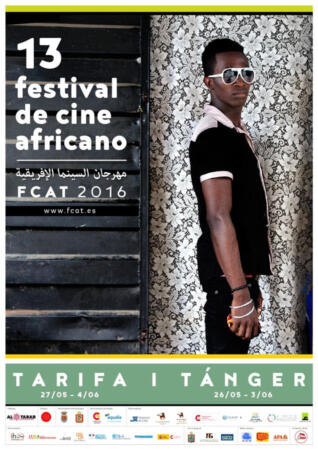
Now in its 13th year, the FCAT 2016/African Film Festival will screen 70 films at different venues in Europe’s southernmost town, Tarifa (Spain), and Africa’s closest city to Europe, Tangiers (Morocco) from May 26 to June 4, 2016. The first cross border edition of the FCAT festival will screen highly anticipated feature length films, documentaries and shorts mainly produced in the African continent.
FCAT will act as a bridge for dialogue between both cities of the Strait, “a geographic area with unique connotations,” explains the FCAT director, Mane Cisneros. The event will include “a selection of films produced in Africa and elsewhere, with a focus on the African continent and its many realities,” she adds.
Venues on both shores of the Strait will screen films competing for awards, as well as a non-competitive film program curated by Tangiers’ Cinémathèque, the festival’s headquarters in Morocco.
Anticipated sale of festival passes is already available for 20€, a price which includes a 20% discount over the price of tickets on sale at the box office. Pass holders will benefit from special discounts on ferry fares to Tangiers with the ferry company FRS. They will equally benefit from discounts on the Madrid-Algeciras train fares with the company Renfe.
Film program
The festival’s program includes a selection of films – mostly unreleased in Spain – spread across seven sections, two of which are competitive. Feature length films and documentaries will compete for a prize in a film section entitled “Hyperopia” or farsightedness. Short films (both fiction and documentary) will compete in the section “In Short.”
In addition, there will also be five non competitive sections: “AfroScope,” an eclectic film selection about contemporary African realities; “Africa in rhythm,” showcasing films about African dances and musics; and “Tangiers, pearl of the North,” comprising a selection of movies curated by Tangiers’ Cinémathèque about the Moroccan city, which will be screened in Tarifa.
A special section entitled “Estrechando” (a game of words in Spanish meaning tightening, as well as straitening, in reference to the Strait of Gibraltar) will be dedicated to stories taking place on both shores of the Strait.
Lastly, a new section, “Ethnographic cinema,” will showcase the results of the work carried out in collaboration with students from the Faculty of Anthropology of the University of Seville.
Parallel Activities
Like in each previous festival edition, film screenings will be accompanied by an array of parallel activities aiming to engage, including activities with schoolchildren within the so-called Schools’ Space; as well as the “Film Appetizers,” a public forum enabling dialogue between filmmakers, the audience and the media in a relaxed atmosphere.
As in previous editions, training on cinema will be offered as part of “The Palaver Tree” activity. The training targets film programmers and curators as well as anyone interested in learning more about African filmmaking.
An FCAT radio workshop entitled “The Radio of the Two Shores” will provide schoolchildren from Tarifa and Tangiers skills and knowledge to run a community radio station – a project which will be carried out throughout the festival’s dates and will help narrow relations between the two cities.
Lastly, every night, FCAT Tarifa will organize its usual Festival Nights in different venues supporting the event, providing guests and festival-goers with music and entertainment to complete the intense days of film screenings.
African photography
Once again, the poster of the 13th FCAT pays tribute to the work of African photographers. The poster is based on a photograph taken by Nigerian artist Andrew Esiebo (Lagos, 1978). The poster of the festival’s previous edition was based on a picture of the Spanish photographer Manolo Yllera, who made a tribute to the Malian photographer Seydou Keïta (1921-2001).
Esiebo is a young acclaimed international photographer whose work reflects scenes of his country’s daily life with a realistic aesthetic, in which social and cultural contents are at the forefront and are approached with deep sensitivity.
Contemporary African photographers “often use their art to challenge existing biased portrayals of the continent,” says the festival director, Mane Cisneros. Challenging established perceptions is one of the goals of the festival. “We strive to open a window to the many existing ‘Africas’ to project a more accurate portrait of the continent’s reality”, she adds. “That does not entail denying the existence of hunger, poverty or despair… We are simply stating that Africa is not just that.”
Broad support
The festival’s main source of support comes from the city councils of Tarifa and Tangiers, the Cadiz provincial council, the Tangiers, Tetouan and Alhucemas Wilaya (provinces) and the Northern Morocco Development Agency (APDN).
To date, FCAT’s main sponsors are the Spanish Cooperation Agency (AECID), the ACERCA training program, the International and Ibero American Foundation for Administration and Public Policies (FIIAPP) and Aqualia. In addition to these, sponsors are also the Spanish branch of Chaabi Bank, the Chaabi Bank Foundation and the Foundation for the Three Cultures of the Mediterranean.
Visit the festival’s website for the full lineup and other information here: http://www.fcat.es/en/inicio-2/

